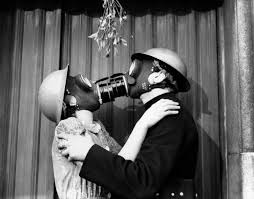
Toxic Relationships
This excellent article written by Steve Garrett first appeared in the Good Men Project in 2018.
Steve outlines his personal experience in a toxic relationship and the difficulties he had in dropping it.

Sometimes we find ourselves unable to walk away from a toxic or damaging relationship.
I was involved for far too long with a woman who, in hindsight, was carrying a lot of emotional baggage. She seemed unable to take responsibility for doing anything about it; for every misunderstanding or conflict between us, she automatically assumed it was my fault. Upon reflection, I now wonder if I was too willing to blame myself for our difficulties because I’d bought into the idea that, by virtue of my being a man, any relationship problem must be down to me.
I did a lot of soul searching during that relationship; trying to make it work, and trying to figure out why I invested so much time into it when plainly it didn’t—and probably couldn’t—get any better. I’ve come to realise that a lot of it was down to my own unmet emotional needs stemming from feeling unloved as a child. Thanks to the pain I experienced in that relationship, I’m finally accepting that no other person can ever meet these old needs, even though that is exactly what a part of me secretly hopes for whenever I date someone!
I understand better now that my need to be loved is the basis for my lovely fantasy of romance: where I feel that I have met someone who accepts me simply for who I am even though the reality is that they’re more likely to be in love with a projection of who they’d like me to be, and vice versa. Whether or not that initial romantic illusion can evolve into a mutual appreciation of who each partner really is will determine if the relationship will stand the test of time, or not.
Because I’ve always been looking outside myself for love and acceptance, my relationships have followed similar patterns of happiness followed by pain, insecurity, jealousy, possessiveness. All negative emotions drain away trust and passion. They lead me to the feeling that I’m with the wrong person and that I need to leave the relationship.
Looking back, I think the woman I mentioned earlier probably suffered from some type of Borderline Personality Disorder. None of it was her fault because her life experiences had given her very good reasons to feel and act the way she did. Someone with her psychological makeup is intoxicatingly attractive to anyone with my kind of self-love deficit. Her way of trying to draw me closer was to charm and entice me with exactly the words and reassurances I longed to hear.
The rest of the time, her ideas about what was acceptable behaviour in our relationship were very different from mine. In an example, she once gave a ten-minute tantrum in the middle of a busy restaurant, listing all my many faults in excruciating detail. Expecting her to be more like me was a sure way for each of us to feel frustrated and disappointed.
An important part of kicking my addiction to this toxic relationship was to realise that her display of intense emotions—the good as well as the horrendous—were not actually about me! This was harder for me to see when she was showering me with praise and compliments, which usually happened just after I would announce again that I was leaving. She was as addicted to the relationship as I was, so couldn’t accept that I would actually go. She demonstrated that she would do and say anything to hook me back. When she got me back, all hell could break out again at any time.
Progress in my emotional learning seems to spiral. The fears and doubts of my inner child and his need for reassurance compel me to go back time after time to find love where my adult mind knows there isn’t any. Each time around, I get another chance to see more clearly what’s actually happening and why I’ll be happier not to go back there again.
I’ve learned that if a relationship isn’t working, it can be up to me how long I want, or need to keep hurting myself by going back. There’s no point feeling guilty about it. Guilt gets in the way of working through and learning the underlying reasons so I can find a better way of relating in the future. This seems to be part of the most difficult and important project in life: becoming emotionally grown up; taking responsible for my own feelings and well-being, free of any resentment or blaming if someone doesn’t behave towards me the way I think they should.
It took going around a few times with my former partner for me to be able to recognise that returning to her was my fruitless attempt to be loved by someone, something I missed when I was a child. She temporarily reassured the insecure attachment I developed at that early age. Unfortunately, she had so many fears from her own past that it was never long before we were clinging onto each other as if we were drowning, going down together.
A healthy relationship is only possible when at least one partner has a reasonably secure emotional foundation. This is what I’m aiming to develop for myself now, rather than still trying to get reassurance and a sense of being OK from what someone else feels about me. I expect that the path to self-love and acceptance is a life-long project. So, I’m being patient with myself and try to smile when I find myself craving love from someone else again, knowing it’s all part of my progress spiral.
Meanwhile, I try to be honest with myself about any choices I make with relationships and why I make them. Then, I reflect on the likely outcomes while taking full responsibility for what happens, taking pains to avoid causing harm to myself or anyone else in the process. We always do the best we can with the knowledge and resources available to us. I accept that I can’t learn faster about how to love. It’s difficult for me, but I’m trying to trust the process, and I know I’m making progress. When I’m ready for a balanced and truly mutual love relationship, I’ll find one.
I may have found one, already and I feel more ready than I ever have. But I’m keeping my hopes and expectations in check, this time. I’m letting things with her evolve in their own time and keeping grounded in my own centre while opening up to her and getting to know her better. With my feet on my own inner ground and whatever happens between us, I’ll have stayed true to myself. I think doing so gives any relationship I have the best chance of flowering in a deeply rooted way. At the same time, it helps to ensure that if it doesn’t work out, I won’t have sold my soul for the short-term gain of being loved, because that can never be a good deal for either of us.
If you feel that you are trapped in a toxic relationship and would like to speak to a therapist, you can find a list of English-Speaking Therapists and Counsellors here https://eshaspain.org/directory/categories/english-speaking-counsellors-therapists/
Leave a reply





Hey, thank you so much for sharing this article. It’s really helpful.
Reply